In honor of November 11th, Veterans Day in the United States, and Armistice Day and Remembrance Day, in other countries, we collected four fascinating wine-related stories involving the U.S. military. We’ve also included a brief history of one of the more humorous quotes ever attributed to President Abraham Lincoln, which he supposedly uttered during the American Civil War.
The Mexican-American War And The El Paso Vineyards That Could Have Been
If you’re familiar with Alexander William Doniphan, you likely know him as the man who prevented the summary execution of Joseph Smith, the founder of Mormonism. Doniphan also served as a celebrated Colonel in the U.S. Army, assisting in a number of important campaigns during the Mexican American War (1846 – 1848), including the capture of Santa Fe. During his long march throughout the Southwest, he passed through El Paso. The vineyards his troops encountered in El Paso fascinated one of the men serving in his unit, a private named John T. Hughes. The wine produced there, known as ‘Pass Wine’ was renowned throughout the region, though the vast quantity produced (200,000 gallons/year if Hughes’s famous war memoirs are accurate), probably earned the wine its fame rather than its quality.

Hughes believed that when the war was over the Americans ought to displace the Mexicans, and build canals to transport the region’s wine north, as he believed the wine to be “superior, in richness of flavor and pleasantness of taste, to anything of the kind I ever met with in the United States, and I doubt not that they are far superior to the best wines ever produced in the valley of the Rhine, or on the sunny hills of France.” He sent his proposal for settlement and canal building to the War Department. The plea apparently fell upon deaf ears. A decade later, when a Federal official passed through El Paso, he found only a few vineyards on the American side of the Rio Grande, and the Mexican vineyards in Ciudad Juárez in a state of decline.
President Truman The Solider: Not A Fan Of ‘Vin Rouge’
President Harry S. Truman served in WWI as a Captain in the U.S. Army, leading Battery D of the 129th Field Artillery, 60th Brigade, 35th Infantry Division. Prior to shipping off to France, he received training at Camp Doniphan, a military base in Oklahoma, named for Alexander William Doniphan, and his exploits in the Mexican-American war.
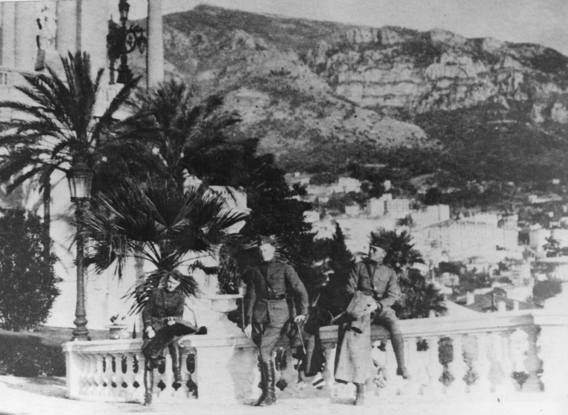
While in Europe Truman wrote a number of letters to his wife Bess, both during the hostilities and in the months after, including an interesting missive sent from Verdun on January 21, 1919. The letter, written just as the negotiations that would produce the Treaty of Versailles had begun, expresses a soldier’s desire to head home, his thoughts on French wine, and his plans to exploit the coming era of Prohibition (emphasis added):
We are having another spasm of moving. There have been orders out twice to move up back to a dirty, little old French village. . . . It’s my opinion that we’ll stay there until Woodie gets his pet peace plans refused or okayed. For my part, and every A.E.F. man feels the same way, I don’t give a whoop (to put it mildly) whether there’s a League of Nations or whether Russia has a Red government or a Purple one, and if the President of the Czecho-Slovaks wants to pry the throne from under the King of Bohemia, let him pry but send us home. We came over here to help whip the Hun. We helped a little, the Hun yowled for peace, and he’s getting it in large doses and if our most excellent ex-mayor of Cleveland [Secretary of War Baker] wants to make a hit with us, he’ll hire or buy some ships and put the Atlantic Ocean between us and the Vin Rouge Sea. For my part I’ve had enough vin rouge and frogeater victuals to last me a lifetime. And anyway it looks to me like the moonshine business is going to be pretty good in the land of Liberty loans and green trading stamps, and some of us want to get in on the ground floor. At least we want to get there in time to lay in a supply for future consumption. I think a quart of bourbon would last me about forty years.
Toasting The Treaty Of Versailles With A Final Glass Of Wine
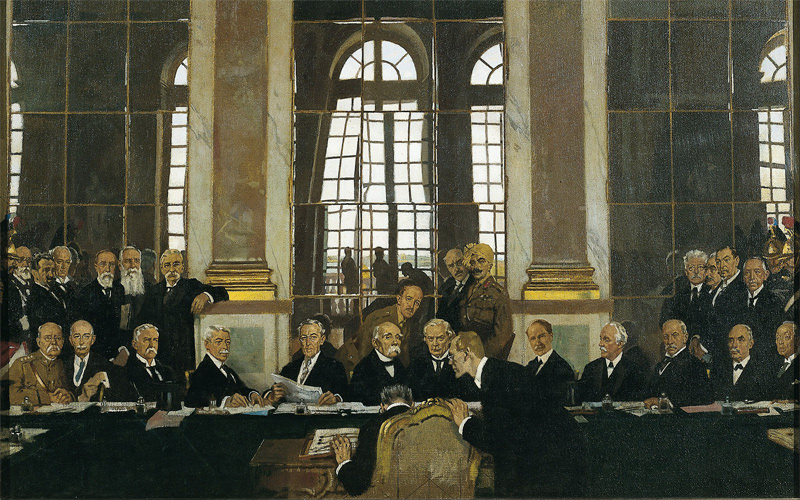
While Captain Truman would remain in France for another three months, the Treaty of Versailles would not be signed until June 28, 1919. When Truman wrote of “Woodie’s…pet peace plans,” he was referring to President Woodrow Wilson’s “14 Points.” The Treaty of Versailles differed greatly from what Wilson hoped for, as the French and the British negotiators largely dictated the final outcome – including the controversial war reparations that helped set the stage for WWII. Still, when the Paris Peace Conference came to an end, toasts were obviously in order. President Wilson’s contingent included a personal friend, Dr. Cary Grayson, who recorded in his diary some playful jabs directed at the Americans:
[French Prime Minister Georges] Clemenceau had tea served for the party. He also had wine brought and proposed a toast to the peace and good health of the party. After the toast had been drunk he turned to me and said: “You had better have another one because you will not be able to get any of this (wine) when you get back home.”
The Race To Take The Eagle’s Nest And Drink Hitler’s Wine
As WWII drew to a close, and Adolph Hitler committed suicide, American and French armed forces closed in on the Führer’s compound in the Bavarian Alps. The American 3rd Infantry Division and the French 2nd Armored Division, though ostensibly under a single American command, raced each to reach the resort town of Berchtesgaden. The alpine village was home to vacation villas belonging to high-ranking Nazi officials, Hitler’s residence, The Berghof, and the Eagle’s Nest (Kehlsteinhaus), which was furthest up the mountain. The questions of which nation’s troops (and within the U.S. Army, which division) first reached the town of Berchtesgaden, Hitler’s residence, and the Eagle’s Nest are all contentious subjects, which you can read a bit about at Wikipedia if you’re interested.
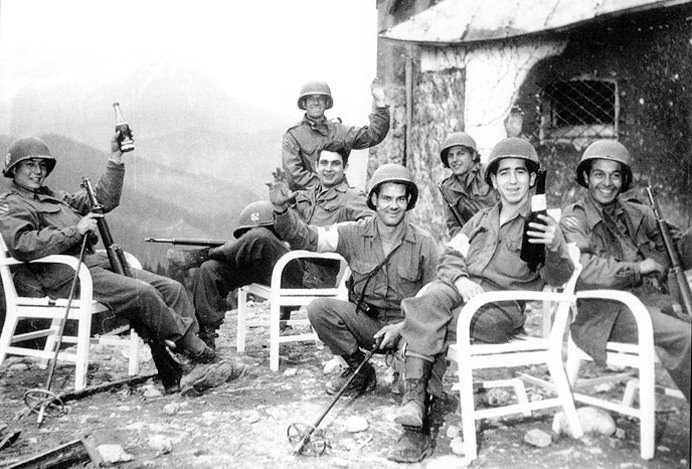
The allure of capturing Hitler’s personal hideaway was only part of the reason the Americans and the French each maneuvered to make it there first. As the Nazis rolled over Europe they carted all sorts of war spoils back to Berchtesgaden – fine art, jewelry, gold, currency, and a lot of wine. Throughout the war the Nazis, despite the best efforts of the French – and they did quite a lot to deceive and deter the Germans – took in massive quantities of French wine. Berchtesgaden was believed to be home to hundreds of thousands of bottles of wine, including the best of the pilfered bottles. To the French, reclaiming the wine was a matter of particular pride, so as both armies closed in on Berchtesgaden, orders were overlooked; first the French and then the Americans attempted to sprint ahead of or around each other.
Whoever made it to Berchtesgaden first, it’s believed that the French reached the final prize, the Eagle’s Nest, before the Americans (though the American’s may have let that occur according to some sources). After an arduous climb to the top, the French discovered roughly half a million bottles of wine, some of the finest vintages of Bordeaux and Burgundy, rare ports and cognacs, and massive quantities of Champagne. Amongst that cache was a huge quantity of junk as well, including lousy Champagne that the French had been happy to dump on the Germans in the late 1930s.
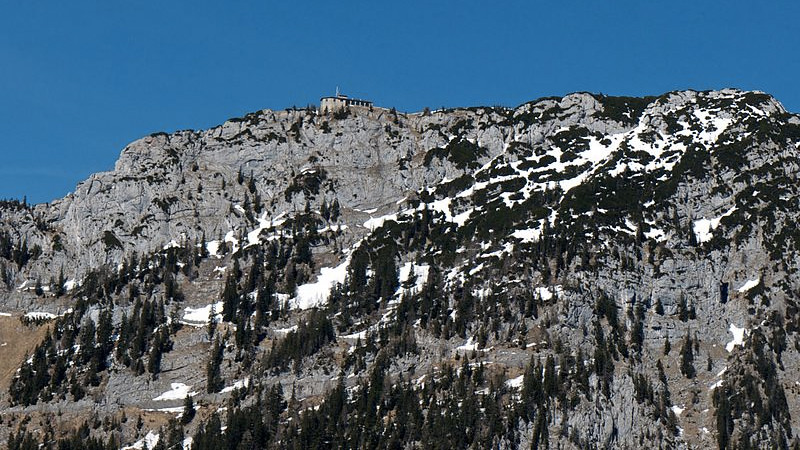
The Eagle’s Nest was connected to the complex below by a 407-foot car-sized elevator shaft, which had been blasted out of the mountain itself. Fleeing German troops had destroyed the elevator – which led to an interesting question: How do you get hundreds of thousands of bottles of wine down a steep mountain. According to Wine & War, Donald & Petie Kladstrup’s fascinating history of wine and WWII, the answer was a convoy of medical stretchers:
With help from the Alpine team, the stretchers were carefully lowered a few hundred meters from the peak to where pairs of stretcher-bearers waited below. The stretchers were then carried slowly down the mountain to where tanks, trucks and other military vehicles were waiting
…
Soldiers stripped their tanks and trucks of everything that was not essential, tossing out clothes, tools, even extra ammunition, to make room for the new cargo. Some of the men emptied their canteens and refilled them with such legendary greats as Latour ’29, Mouton ’34 and Lafite ’37.
A Fun Additional Story: General Ulysses S. Grant’s Brand Of Whiskey
Unfairly or not, General and future President Ulysses S. Grant was hounded by rumors of alcoholism throughout his military career. Whatever the case, President Lincoln stood behind Grant, ignoring the constant rumors. After Grant took Vicksburg, splitting the Confederacy in two by taking control of the Mississippi River, Lincoln promoted him, giving him command of the entire Union Army in the western theater. Soon he would be recalled east to help end the Civil War.
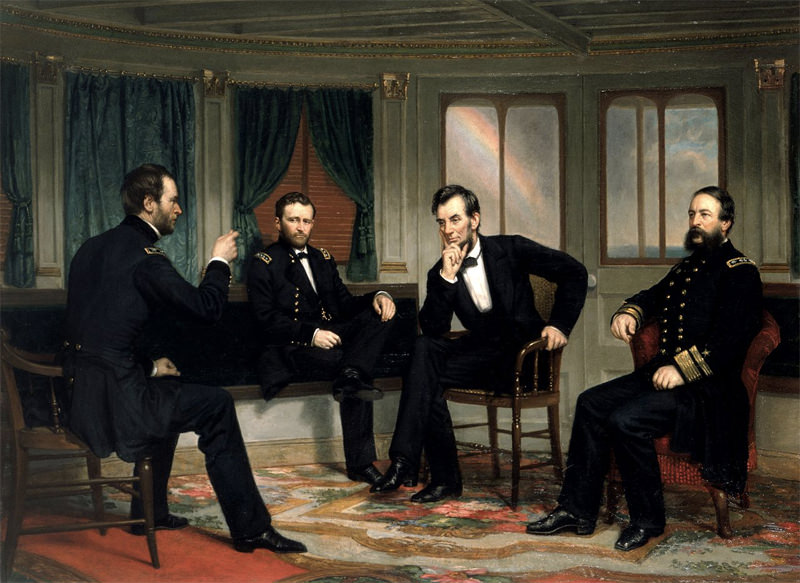
Throughout all of his successes, the rumors persisted – bouts of drunkenness during the vital campaign to take Vicksburg among them – leading Lincoln to (supposedly) joke:
After the failure of his first experimental explorations around Vicksburg, a committee of abolition war managers waited upon the President and demanded the General’s removal, on the false charge that he was a whiskey drinker, and little better than a common drunkard. “Ah!” exclaimed Honest Old Abe, “you surprise me, gentlemen. But can you tell me where he gets his whiskey?” “We cannot, Mr. President. But why do you desire to know?” “Because, if I can only find out, I will send a barrel of this wonderful whiskey to every general in the army.”
There are countless variations of the quote. Quote Investigator discovered the version above in the New York Herald’s September 18, 1863 edition in their unsuccessful attempt to prove or disprove whether Lincoln ever joked about Grant’s (supposed) drunkenness. They believe it to be earliest verified recording of the story. While we’ll never know whether or not Lincoln made the joke, after over 150 years no one has managed to disprove it!
Sources:
Wine and War: The French, the Nazis and the Battle for France’s Greatest Treasure by Donald & Petie Kladstrup
Mint Julep’s With Teddy Roosevelt: The Complete History Of Presidential Drinking by Mark Will-Weber
A History Of Wine In America, Volume 1 by Thomas Pinney.
